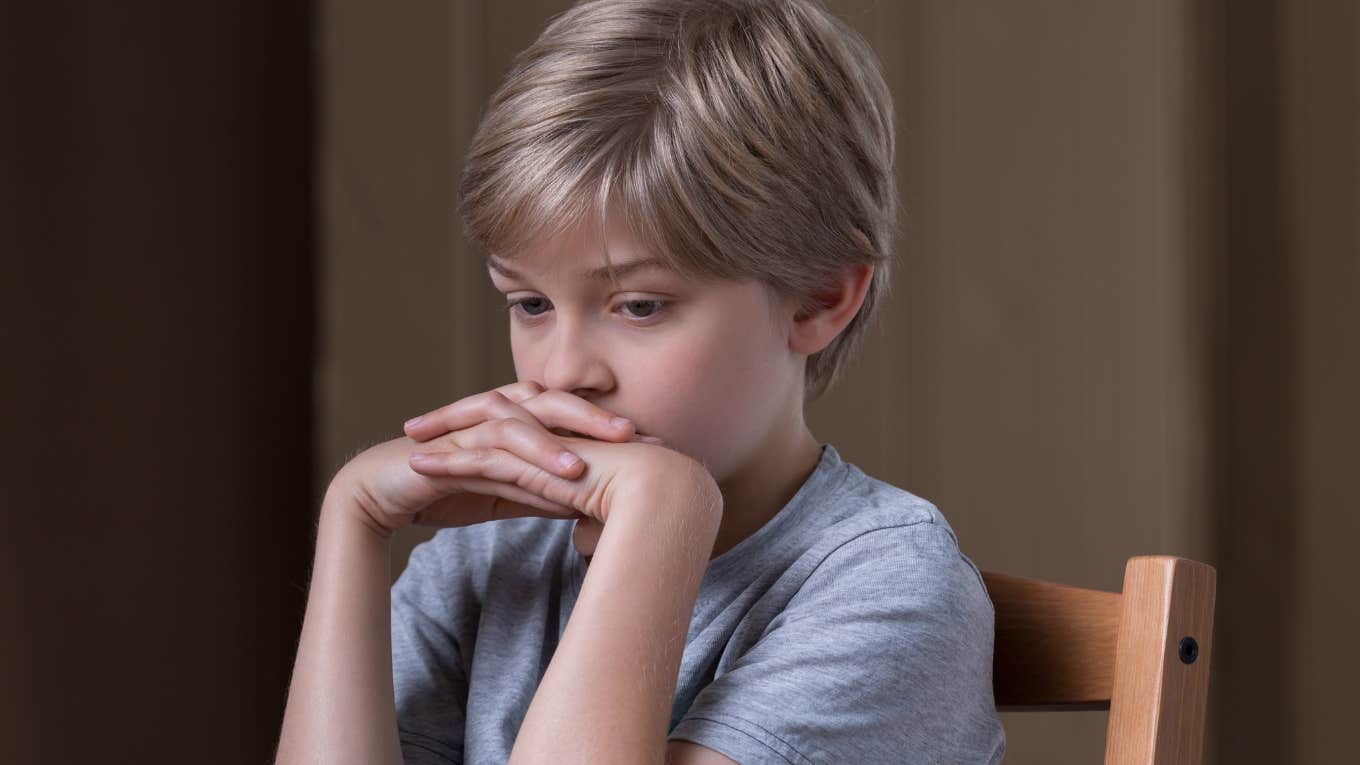The Subtle Mental Shift That Helps People Heal From A Damaging Childhood
You can't change the past, but you can prepare for the future.
 KatarzynaBialasiewicz | Canva
KatarzynaBialasiewicz | Canva While many don’t feel comfortable acknowledging it, your childhood is the foundation for the rest of your life. You learn to love, grieve, bond, and yearn — all within the first decade of living. Whether you view it as good, bad, or neutral, there’s a power in understanding how it affects you today.
From building healthy relationships to blossoming into your identity — your parents and childhood play a large role in the way you navigate the world. For many, parental abandonment, disappointment, and neglect plagued this impressionable time in their lives — inherently affecting their perspective on life, love, and connection.
An Open Relationships Podcast from YourTango on “living fearlessly” vulnerably opens up this conversation — with World Champion & Hall of Fame Triathlete Siri Lindley providing her own special insights on forgiveness and an empowered reclamation of pain.
How can we heal from the trauma of our past — going further than just acknowledging the hurt, blaming our parents, or isolating ourselves completely? Lindley’s insights might just be the key to unlocking a more fulfilled life — one where we can forgive the past, ourselves, and our parents and move forward into an empowered reality.
The subtle mental shift that helps people heal from a damaging childhood
“I’ve reached a point in my life where I don’t want to suffer anymore,” Lindley honestly admits. It was this realization that profoundly impacted the rest of her life and career — she wasn’t willing to keep placing blame on her past for the pain of the present moment.
For anyone who’s exhausted with carrying the burden of your past, the key to living a life of freedom is within you — just shift your perspective. Stop placing blame, deflecting pain, and putting shackles on yourself for the behavior of others — you deserve peace, happiness, and love.
 Perfect Wave / Shutterstock
Perfect Wave / Shutterstock
“Nothing moves without pressure. We grow the most through those challenges,” Lindley says. “If we want to become more in our lives, we have to put more pressure on ourselves…trying to find the lesson in [the pain] or become more in overcoming it.”
So, what does it mean to shift your perspective — how can you unlearn, or rather heal, from the trauma of your past?
Instead of simply blaming your parents or your past, honestly acknowledge they’re affecting your current reality.
Whether it’s parental trauma, sibling guilt, or another painful childhood experience — the trick to healing can be relatively simple: stop blaming and start acknowledging. We spend so much of our time as adults placing blame on others for our current struggles — whether it be our relationship with our parents or something completely different.
Recognize that while it might feel like it, not every hardship we experience is a direct result of our parents’ behavior or our childhood experiences. We can acknowledge the ways in which they hurt us — but, ultimately we’re responsible for taking control of our own lives.
“I needed to shift my focus to the things that make me feel good and not bad, what I have versus what’s missing, what I can control versus what I can’t — so that I can create a better experience in times of joy and pain.”
Forgiveness, ownership, & empowerment are the keys to freedom from your parental trauma.
“You’ve got to do the work. It’s the work of feeling your feelings around it — of going there and looking back.”
Lindley goes on to share the vulnerable story of her father’s impact on her life. After years of absence, and her own rumination in the hurt, her father finally started to call. Instead of focusing on “the good or the optimism” in their conversations — she couldn’t help but get angry, yelling and blaming him on every call. “Then, he just stopped calling all together — for over 20 years.”
When we blame, we introduce anger into our lives instead of joy. When we make the choice to control our own lives, set healthy boundaries with our pain, and start forgiving — it can be the key to healing. While it may be “simple,” it’s surely not easy to confront this trauma — but the end result is more than worth it.
 Rido / Shutterstock
Rido / Shutterstock
How to shift your perspective when it hurts too much.
Maybe when you were in your teens or navigating through your 20s, it was easier to isolate yourself from your pain — pushing your childhood or the relationship with your parents into a void. The truth is, that pain never truly dissolves, even when it’s not directly affecting you — it only continues to fester until it’s acknowledged.
When we grow older and start to pinpoint the ways in which our pain defines us, it can be so impossible to not want to go back to isolation — remembering the ways that pushing our pain away helped us navigate through early adulthood. However, Lindley — and many other mindset experts — suggest reopening the wound.
If your relationship with your father wasn’t the best — understand how that pain affects you today. In order to heal from it, it’s necessary to acknowledge it. Get realistic about all of it — what you can control, what you can’t, and how the boundaries of this pain are affecting you.
Understand the boundaries of your pain.
“If you blame [them] for all the bad in your life, you also have to credit [them] for all the good,” Lindley acknowledges. It’s impossible to forgive the people who harmed us by solely looking at the bad — we have to see the full picture to truly move forward.
Setting boundaries doesn’t have to mean addressing these people directly — maybe you’ve created distance, they’ve passed away, or they don’t even fully understand how they’ve affected you — it can be as simple as creating boundaries for yourself.
“Blame them effectively,” Lindley continues. “Holding onto this pain and resentment, it almost gives me an excuse or disempowers me. When I have someone to blame, I’m always looking at this part of my life saying, ‘it wasn’t as good as it could’ve been because of my dad’...if you have someone to be angry with and to blame, you are disempowered.”
Acknowledge what you can control and what you can’t.
“When we forgive, we become free. We remove the shackles of disempowerment and pain — that is to blame. I feel like loving yourself and our relationship with ourselves — why wouldn’t we believe something that makes us feel better.”
What are the things that you can focus on — whether it’s throughout your daily life, in therapy, or just in everyday moments? How can you control your own life, emotions, and perspective to cultivate a healthier life?
“You own every aspect of your experience in life,” Lindley admits. “It's what you focus on, it’s the meaning you give it, it’s what you choose to do about a situation that creates your experience in life. Life is up to you.”
Set your own boundaries to reclaim your life.
Shifting your perspective away from blame and towards acknowledgement is the key to unlocking an empowered mindset — despite the parental trauma you’ve experienced. So many of us live in fear, anxiety, and turmoil — trying to continuously blame the conditions of our childhood for our pain today.
Use Lindley’s insights as a way to break that cycle — understand the boundaries of your pain, what you can own yourself, and how to forgive the things that are outside your control. Embracing this shift and setting healthy boundaries with your pain can transform your life — allowing you to embark on a journey of self-discovery, empowered joy, and healing.
If you or somebody that you know is experiencing a mental health crisis, there is a way to get help. Call SAMHSA’s National Helpline at 1-800-662-HELP (4357) or text "HELLO" to 741741 to be connected with the Crisis Text Line.
Zayda Slabbekoorn is a staff writer with a bachelor’s degree in social relations & policy and gender studies who focuses on psychology, relationships, self-help, and human interest stories.

